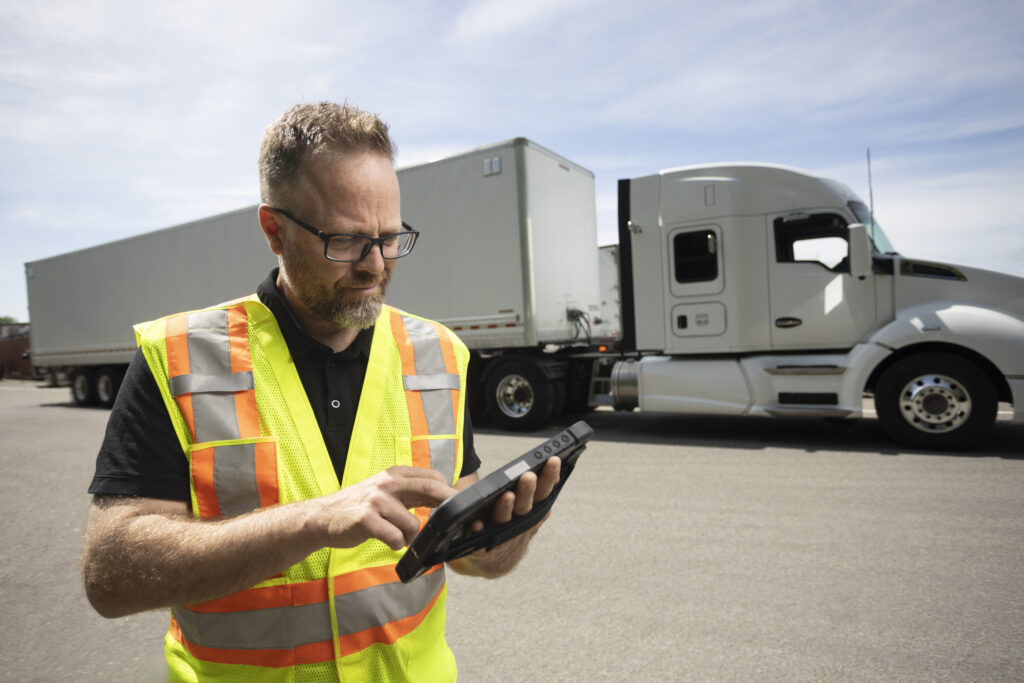Learning from the experience of peers
Our peer discussion, “Lessons Learned from Consumer-Grade Tablets,” was ISAAC’s first webinar of the year. It brought together leaders from Quality Carriers, Peters Brothers Trucking, and Veltri Inc. It holds valuable insights to help you avoid problems with fleet tablets.
In this insightful mind melt, these experts shared their experiences and challenges with using consumer tablets in their fleets and discussed ways to improve efficiency and operations.
If you missed the webinar, this article provides 5-point summary. You can also watch the full discussion here.
1) Choose tough and reliable tablets

Consumer tablets are made for home or office use, not the tough environment of trucking. They can’t resist vibrations, temperature changes, or rough handling.
Trucking-specific fleet management tablets, such as those ISAAC provides, are built to excel even in the most demanding trucking environments. When your drivers are on the road, having a durable tablet for trucks in the cab will give them peace of mind and reliability, which are invaluable when working in freezing winter conditions or scorching summer temperatures. Having anything less has left carriers with swelling batteries and tablets that fail.
Dave Maxim, Director of Operations at Quality Carriers, said: “When you look at the long-term value, they [consumer tablets] don’t last.”
2) Ensure compatibility with existing systems
All three experts sharing their experience in the webinar agreed on the importance of having an ELD that integrates with the company’s transport management system (TMS). Before you fully commit to a system, test the integration and the tablet compatibility with your TMS. With ISAAC’s fleet efficiency tablets, open APIs ensure seamless integration and smooth data flow across fleet management systems, which practically eliminates delays and data errors.
Lou Giardelli, Veltri’s IT Director said: “Having a provider with as many open APIs as ISAAC did was really important.”
3) Consider Tracking and Monitoring

Tight, accurate tracking of operations for a carrier is a game changer when it comes to operational efficiency and satisfying customers. To achieve this, you need reliable, unfailing devices inside your trucks that collect quality data and transmit it to your systems in real time. This type of quality infrastructure helps your operations team be efficient and keep your customers posted on where their load is at.
Dave Maxim summarizes it well: “It’s not just your drivers impacted [by failing tablets], or just your safety team or your dispatchers. It also starts to impact your customers. We’ve got a lot of customers expecting either EDI transactions or information through third-party track and trace solutions and real-time positions of our trucks. When a device goes down for half an hour or for seven days, it defeats the purpose and they hold us accountable for that tracking. […]We’ve now got customers that we’re tracking at 98, 99, 99.5%, which is incredible. That goes to how well the workflow works, how well it’s integrated.”
A critical consideration regarding your confidential efficiency-enhancing data is protecting it. This should be among your top criteria when choosing an in-cab device and the platform it runs on. ISAAC’s secure fleet tablets run on a cyber-secure platform using the most stringent industry standards. Read more about why cybersecurity should be a top priority for your fleet in our blog article.
4) Evaluate the long-term cost of fleet tablets
Consumer tablets may seem like an affordable choice at first glance. They are cheaper up front and come with great features: a wide color gamut display, high-fidelity speakers, and the latest gadgets. From an entertainment standpoint, they surpass industrial-grade tablets. However, the last thing you want is a driver watching YouTube or playing mobile games while driving, since their tablet is meant to be used for work, not entertainment.
Trucking-focused, industrial-grade tablets, like ISAAC’s G or M models, are designed for a longer lifecycle—they are built to last. They’re also designed to prevent driver distraction and lock while driving to enhance safety on the road.
When considering long-term costs, consumer tablets often require frequent maintenance and replacements, which can lead to higher expenses over time. Investing in reliable, industrial-grade technology ensures longevity and reduced maintenance costs, making it a more cost-effective choice in the long run.
If you currently use consumer tablets, we encourage you to track all associated costs over a year, including frequent repairs, replacements, downtime, and the effort your team spends troubleshooting. You might find that unlike ISAAC tablets, consumer devices often incur higher maintenance and operational expenses.
5) Assess global operational efficiency
Different tools have different applications. A consumer tablet is great for entertainment, while an industrial tablet is built for work.
Vehicle tracking, maintenance alerts, and driver performance monitoring are just a few examples of how tablets such as ISAAC’s excel. “The ability to pull data out of ISAAC’s system is the biggest thing that’s happened to our company from a technology perspective. It drives other systems, not only our TMS, but our fleet system. It drives a payroll process we created and it really works,” shared Lou Giardelli from Veltri Inc.
The seamless integration of multiple systems, such as fleet management and payroll, streamlines your operations and makes daily tasks easier and more efficient both for your drivers and office team.
The right tool for the job
Choosing the right tool for the job is crucial for the success and efficiency of your fleet and to avoid problems with fleet tablets. ISAAC’s tablets are specifically designed for the trucking industry, providing durability, seamless integration, advanced security, and reliable performance. Lou Giardelli recounts: “From the planning to the rollout implementation, it was all positive. I just don’t recall any of those angry calls that I’m sure many of us have had with vendors asking why isn’t this working? I don’t think we had any of that stuff. Another point is that it’s refreshing to be able to talk to people at the owner and founder level when you need to. It’s just good business.”

About the author
Neil Abt
VP Public Relations, ISAAC Instruments
Neil Abt, Vice President of Public Relations at ISAAC Instruments, is a veteran journalist with over 25 years of reporting experience, including 20 years spent covering the trucking industry. A graduate of American University in Washington, D.C., he began his career covering sports for The Washington Post, followed by a position in the newsroom of America Online (AOL) and then both reporting and leadership roles at Transport Topics and Fleet Owner. Neil is based out of Portland, Oregon.











